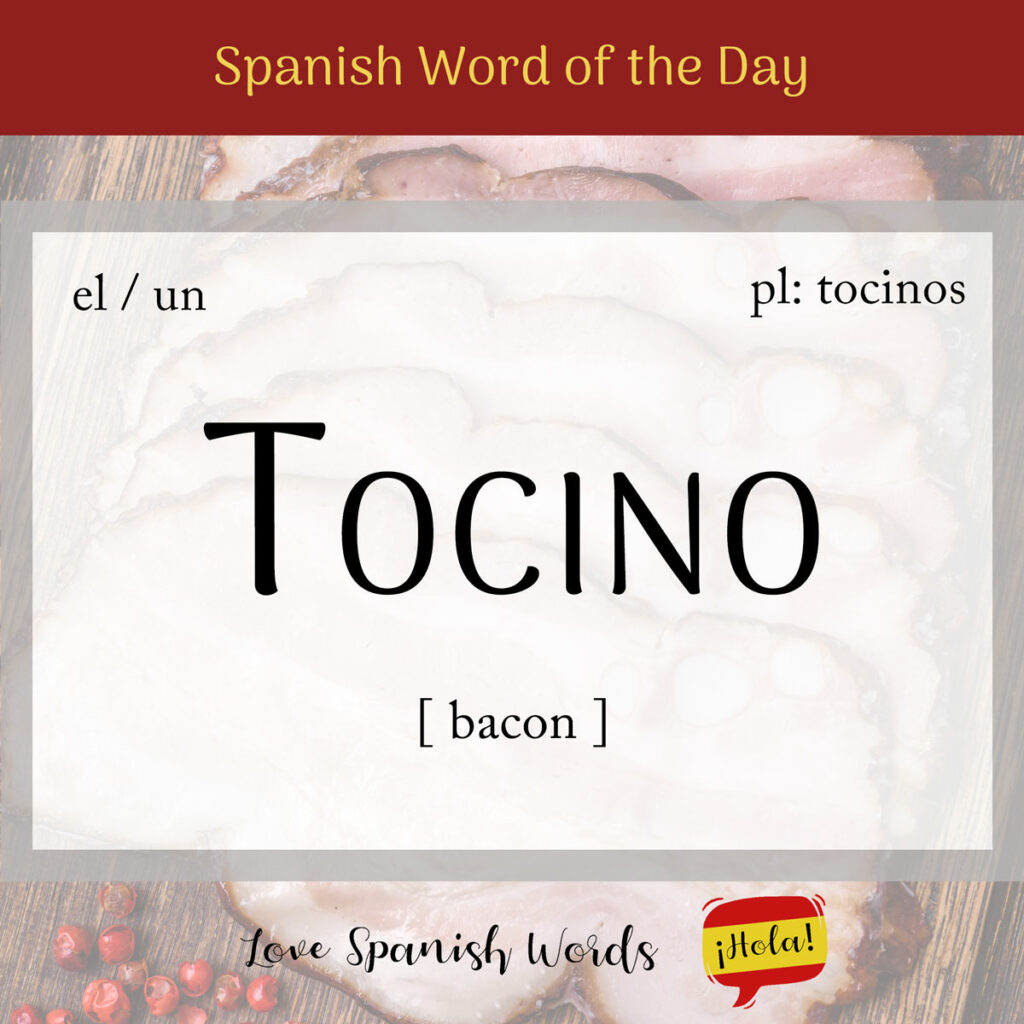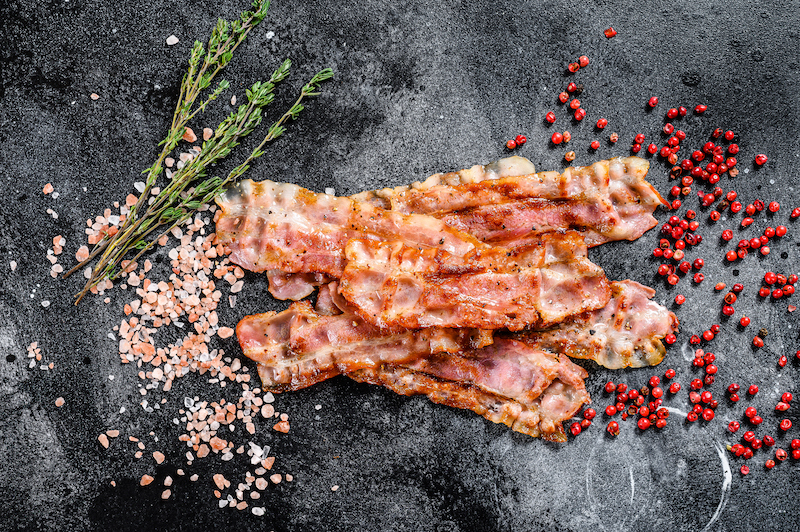The word tocino derives from the Latin word tursinus, meaning fat or grease. Tocino is bacon in English and it’s what we know as the cured fat we get from pork.
Latin American Pronunciation
European Pronunciation

Tocino is a masculine noun, countable or uncountable. Therefore, its English plural form can be bacon or bacons, though the singular bacon is more common. In Spanish, the plural form is tocinos. Below, you will find the definite and indefinite articles for tocino.
- el tocino = the bacon
- los tocinos = the bacon / the bacons
- un tocino = a bacon
- unos tocinos = some bacon / some bacons
Me gusta desayunar huevos revueltos con tocino como acompañamiento.
I like to have scrambled eggs for breakfast with bacon on the side.
Tocino is a food made from puerco (pork), which comes from cerdos (pigs). It is made by cutting meat from the pig, usually its belly or back. The meat is then cured, which means it’s covered in a mix of especies (spices), sal (salt), and sometimes azúcar (sugar). This is done not only to add flavour but also to preservar (preserve) it. Once it’s been cured, the bacon is sliced into thin strips ready to be cooked and eaten.
Some tocino comes with a sabor ahumado (smoky flavor). This is done by exposing bacon to burning wood.
People who eat tocino either fríen (fry) or hornean (bake) it. When frying it, the bacon is put into a pan on the stove until it’s crujiente (crispy). If baking it, the tocino is placed on a baking sheet that goes in the horno (oven).

Fun Fact:
Tocino is one of the oldest carnes procesadas (processed meats). The Chinese began curing it in the 1500s.
Tocino is a popular breakfast food because it has a delicious sabor salado (salty taste) that people love. It’s usually served as tiras de tocino (bacon strips) alongside eggs, pancakes and sausages for breakfast.
It’s also included in other dishes such as sopas (soups), guisados (stews), ensaladas (salads), sándwiches (sandwiches), and even postres (desserts). It can be included in many recetas (recipes) because of its versatile flavour.
The downside of tocino is that it’s not the healthiest choice of food. Despite being so tasty, it’s recommended to be eaten in moderation due to its alto contenido de grasa no saludable y sal (high unhealthy fat and salt content). It’s best as an occasional treat rather than a daily food.
If you love tocino but want to make a healthier food choice, you can eat tiras de tocino de pavo (turkey bacon strips). These strips are made from turkey, which is a healthier choice of meat, but they mimic tocino made from pork. The turkey meat is cut into strips to make them look similar and they are seasoned to make them taste as close as possible to pork bacon strips.
Mi hermana no come tocino porque dice que no es saludable.
My sister doesn’t eat bacon because she says it’s unhealthy.
Below is a list of foods that include the word tocino:
- huevos con tocino = eggs with bacon
- ensalada de tocino = bacon salad
- tocino a la parrilla = grilled bacon
- sándwiches de tocino = bacon sandwich
- papas con tocino = potatoes with bacon
- tocino caramelizado = caramelized bacon
- tocino en guisos y sopas = bacon stew or soup
- tocino y macarrones con queso = bacon macaroni and cheese
- tocino del cielo = heaven bacon (Spain dessert)
- tocino envuelto en datiles o ciruelas = bacon wrapped in dates or plums
- jalapeños envueltos en tocino = bacon wrapped jalapenos
In Colombia and Venezuela, tocino is commonly called tocineta, referring to thinly sliced or streaky bacon. In Argentina, Uruguay, and parts of Spain, the term panceta is more prevalent, often referring to both cured and uncured pork belly. Meanwhile, in Spain and some Latin American countries, you might hear beicon, an adaptation of the English word bacon. Additionally, in Mexico, tocino entreverado refers to bacon with a mix of fat and lean meat.

Spanish idioms and metaphors featuring ‘tocino‘
Tocino de cielo (heaven bacon) is a typical candy made in Spain. It contains egg yolk and sugar. The candy’s name can be used metaphorically to refer to something that’s delicious. For example, you could say, Esta tarta es un verdadero tocino de cielo. (This cake is truly heaven bacon.)
The popular English phrase bring home the bacon does not translate the same in Spanish. Instead, the metaphor for earning one’s living in Spanish is ganarse las habichuelas. It translates in English to earn the beans.
Estar hecho un tocino
Literal translation: to be made a bacon
English meaning: to be fat or overweight
Vender el tocino antes de matar al cerdo
Literal translation: to sell the bacon before killing the pig
English meaning: to talk about something or act on something ahead of time, before it has happened

